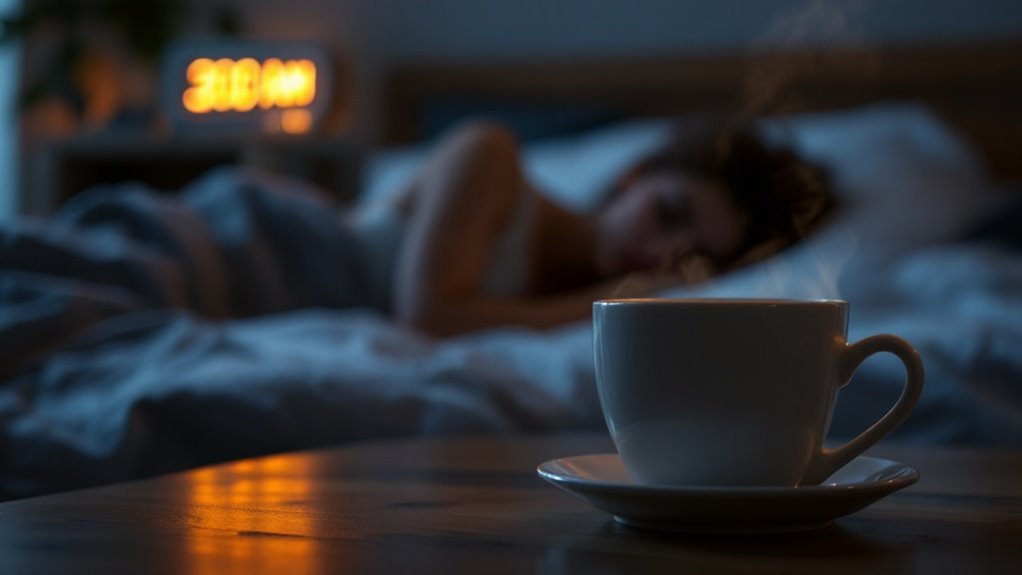



You might think that cup of coffee in the late afternoon is harmless, but it could be quietly sabotaging your sleep. Caffeine blocks adenosine, a chemical that builds up in your brain to signal tiredness, keeping you alert when you should be winding down. Even if you fall asleep, the quality of your rest may suffer, with less time spent in deep, restorative stages. The timing of your coffee matters, but so does how your body processes caffeine. What if the key to better sleep isn't giving up coffee entirely, but knowing when and how much to drink?
Key Takeaways
- Caffeine blocks adenosine receptors, delaying sleep onset by up to 2 hours and reducing total sleep time by 41 minutes.
- Consuming caffeine within 6 hours of bedtime increases wake time and disrupts restorative slow-wave sleep by up to 44 minutes.
- Chronic caffeine use alters sleep architecture, reducing sleep efficiency and making it harder to achieve restorative sleep.
- Individual caffeine metabolism varies, with half-lives ranging from 1.5 to 12 hours, influencing sleep disruption severity.
- Limiting caffeine intake to mornings or early afternoons and avoiding it 8 hours before bed preserves sleep quality.
How Caffeine Disrupts Sleep Patterns
Caffeine disrupts sleep patterns by blocking adenosine receptors, which prevents the buildup of sleep-inducing chemicals and delays sleep onset by up to 2 hours. When you consume caffeine 6 hours before bedtime, it reduces your total sleep time (TST) by 41 minutes and increases wake time during sleep by 8 minutes. Caffeine also diminishes slow-wave sleep, a restorative stage, by up to 44 minutes when taken close to bedtime. Even small doses can alter sleep architecture, reducing stage 1 and 2 sleep by 40.6 to 44.1 minutes. Chronic use consolidates wakefulness, delaying sleep onset and increasing sleep latency. These disruptions fragment sleep stages, impairing overall sleep quality and leaving you less refreshed. Avoiding caffeine close to bedtime minimizes its impact on sleep architecture and promotes better rest.
The Role of Adenosine in Sleep Regulation
As you stay awake, adenosine gradually builds up in your brain, signaling the need for sleep by binding to specific receptors. This accumulation promotes sleepiness and regulates sleep-wake shifts through interactions with A1 and A2A adenosine receptors. High adenosine levels during prolonged wakefulness enhance the drive for slow-wave sleep (SWS), a deep, restorative stage critical for sleep quality. When adenosine binds to its receptors, it facilitates sleep onset and maintains sleep depth. However, caffeine disrupts this process by blocking adenosine receptors, preventing adenosine from signaling the brain to induce sleep. This interference delays sleep onset and reduces sleep quality, particularly by diminishing SWS. Understanding adenosine's role highlights how its natural regulation supports healthy sleep patterns, while its disruption can impair restorative sleep.
Timing of Coffee Consumption and Sleep
While coffee can enhance alertness during the day, its timing plays a critical role in determining its impact on sleep quality. Consuming caffeine even 6 hours before bedtime can reduce sleep duration by 41 minutes and lower sleep efficiency (SE). If taken 3 hours before bedtime, it increases sleep latency and wake time, further disrupting rest. The time of day you consume caffeine matters—sleep specialists recommend cutting off daily caffeine consumption by early afternoon to minimize its effects on sleep. Chronic caffeine use can amplify these disruptions, making it harder to achieve restorative sleep. To avoid these issues, aim to stop caffeine intake at least 8 hours before bedtime. This simple adjustment can help preserve sleep duration and efficiency, ensuring better rest.
Caffeine Metabolism and Individual Differences
Because caffeine metabolism varies widely among individuals, its effects on sleep quality can differ substantially from person to person. The half-life of caffeine ranges from 1.5 to 12 hours, influenced by factors like genetics, nicotine use, and pregnancy. Genetic variations in the CYP1A2 enzyme, which breaks down caffeine, determine how quickly your body processes it. If you're a smoker, nicotine use can speed up caffeine metabolism, reducing its half-life by up to 50%. Conversely, pregnancy slows caffeine metabolism, doubling its half-life and prolonging its impact on sleep. Individual differences in CYP1A2 activity mean some people may experience sleep disruptions even with afternoon caffeine consumption, while others metabolize it quickly and remain unaffected. Understanding these variations helps explain why caffeine affects sleep differently across individuals.
Safe Daily Caffeine Limits for Better Sleep
To maintain better sleep quality, it's important to adhere to safe daily caffeine limits, as exceeding these can disrupt your sleep patterns. For most adults to consume, the FDA recommends a daily caffeine intake of no more than 400 milligrams, roughly equivalent to four cups of coffee. Consuming caffeine within six to eight hours before going to bed can markedly delay sleep onset and reduce total sleep time. Chronic caffeine consumption may also lead to tolerance, diminishing its alertness benefits while still affecting sleep. To guarantee good sleep, coffee drinkers should limit caffeine intake to earlier in the day, ideally before 2-3 p.m. Timing and moderation are key to minimizing the effects on sleep taken later in the evening.
Effects of Coffee on Sleep Stages
Caffeine disrupts deep sleep by blocking adenosine receptors, reducing slow-wave sleep and leaving you feeling less refreshed. It doesn't affect REM sleep but can delay sleep onset, making it harder to fall asleep initially. Even when consumed 6 hours before bed, caffeine shortens total sleep time and increases nighttime awakenings.
Disruption of Deep Sleep
Although coffee is often consumed for its energizing effects, it can markedly disrupt deep sleep, a crucial stage for feeling rested. Caffeine blocks adenosine receptors, preventing the buildup of sleep-inducing chemicals in your brain, which reduces slow-wave sleep (SWS). Studies show that consuming caffeine even 6 hours before bedtime can cut your total sleep time by 41 minutes, primarily by shortening deep sleep. Chronic caffeine use further decreases SWS duration, especially when consumed close to bedtime. This disruption alters your sleep architecture, reducing combined stage 1 and 2 sleep by 40.6 to 44.1 minutes, which impacts deep sleep quality. Even small amounts of caffeine interfere with adenosine, a key chemical for promoting deep sleep, leading to fragmented and less restorative rest.
Impact on REM Sleep
While caffeine is known to disrupt slow-wave sleep, its effects on REM sleep are less pronounced. Chronic caffeine consumption doesn't markedly alter total REM sleep duration, but it increases brain blood flow during this stage. This enhanced blood flow may improve metabolic waste clearance, potentially offering neuroprotective benefits. Studies show that caffeine taken 6 hours before bedtime doesn't directly affect REM sleep, though it reduces total sleep time and increases wakefulness. Even during caffeine withdrawal, habitual consumers maintain stable REM sleep architecture, suggesting minimal direct disruption. Unlike its consistent impact on slow-wave sleep, caffeine's influence on REM sleep appears subtle, with potential benefits tied to increased brain activity. However, the exact mechanisms behind these effects remain under investigation.
Sleep Onset Delays
When consumed even several hours before bedtime, coffee can substantially delay the time it takes to fall asleep. Caffeine effects on sleep include blocking adenosine receptors, which prevents adenosine builds that normally promote drowsiness. This increases sleep latency, making it harder to fall asleep. Studies show that caffeine taken 6 hours before going to bed can delay sleep onset by up to 24 minutes. Even small afternoon doses disrupt natural circadian rhythms, prolonging the time it takes to drift off. The disrupting effects of caffeine are dose-dependent, with higher amounts close to bedtime causing more significant delays. If you consume coffee late in the day, you're likely to experience longer sleep latency, as caffeine's stimulant properties counteract your body's natural sleep signals.
Alternatives to Coffee for Daytime Alertness
If you're looking to reduce your reliance on coffee for daytime alertness, several evidence-based alternatives can help. Start your day with morning light exposure, which signals your internal clock and boosts alertness naturally. Incorporate regular physical activity into your routine, as it enhances energy levels and improves sleep quality. Short power naps, lasting up to 20 minutes, can restore energy without disrupting nighttime sleep. Staying hydrated and eating balanced meals throughout the day helps maintain steady energy levels, reducing the need for caffeine. Herbal teas like chamomile or peppermint offer a calming energy boost without the sleep-disrupting effects of coffee. These strategies can help you stay alert while minimizing reliance on caffeine.
Long-Term Impact of Coffee on Sleep Quality
Chronic caffeine consumption can disrupt your sleep patterns over time, delaying sleep onset and altering circadian rhythms. It also affects adenosine receptors, reducing their sensitivity and potentially leading to persistent changes in sleep architecture. These cumulative effects may result in poorer sleep quality and increased reliance on caffeine to maintain wakefulness.
Chronic Sleep Disruption Patterns
While caffeine may help you stay alert during the day, chronic consumption can substantially disrupt your sleep patterns over time. Regular coffee intake delays sleep onset and reduces total sleep time by up to 1.2 hours, altering your circadian rhythms. These disruptive effects persist even after you stop drinking coffee, as withdrawal effects can heighten adenosine receptor sensitivity, prolonging sleep disturbances. Chronic caffeine use also changes sleep architecture, reducing EEG power density in sigma frequencies, which are critical for restorative sleep. Over time, habitual coffee consumption creates a cycle of sleep deprivation and increased dependence, worsening sleep quality. Additionally, it increases brain blood flow during sleep phases, further impairing restorative processes. These long-term patterns highlight how chronic coffee use undermines your ability to achieve consistent, high-quality sleep.
Cumulative Adenosine Receptor Effects
Because caffeine blocks adenosine receptors, long-term coffee consumption can lead to their upregulation, making your brain more sensitive to adenosine over time. Chronic caffeine consumption alters sleep-wake regulation by increasing adenosine receptor density, which enhances the brain's response to adenosine even after caffeine is metabolized. These adenosinergic changes can delay sleep onset and reduce sleep quality. Additionally, chronic caffeine use reduces sigma EEG activity during NREM sleep, reflecting long-term neurophysiological adaptations. If you stop consuming caffeine, upregulated adenosine receptors may trigger withdrawal symptoms, such as increased sleepiness and disrupted sleep structure. Over time, these cumulative effects can impair your ability to achieve restorative sleep, highlighting how persistent caffeine exposure reshapes the adenosinergic system and impacts sleep neurophysiology.
Persistent Sleep Architecture Changes
Long-term coffee consumption doesn't just temporarily disrupt sleep—it can lead to lasting changes in sleep architecture. Chronic caffeine use may reduce sigma frequency EEG power density during NREM sleep, altering sleep stage dynamics and neurophysiological patterns. Polysomnography (PSG) studies show that while total sleep time (TST) and sleep latency may remain stable, sleep efficiency (SE) can subtly decline over time. Caffeine upregulates adenosine receptors, which disrupts sleep-wake regulation and consolidates wakefulness, potentially delaying sleep onset. Even after withdrawal, reduced sigma activity persists, indicating enduring adaptations in sleep parameters. These changes suggest that habitual caffeine intake doesn't just affect immediate sleep quality but can reshape your sleep architecture, making it harder to achieve restorative sleep in the long term.
How to Identify Caffeine-Related Sleep Issues
If you suspect caffeine is affecting your sleep, tracking your intake and sleep patterns can help pinpoint the issue. Start by recording your caffeine consumption, noting the times and amounts, as late-day intake can disrupt sleep. Monitor sleep latency, as caffeine can delay falling asleep by up to 24 minutes, and track your total sleep time, which may decrease by 1-2 hours. Use a sleep diary or app to identify sleep disturbances, such as frequent awakenings or reduced deep sleep, that correlate with caffeine use. Pay attention to daytime sleepiness or reliance on caffeine for alertness, as these may signal caffeine-related sleep issues. Experiment with cutting off caffeine 6-8 hours before bed to assess improvements in sleep quality.
Tips for Reducing Coffee's Impact on Sleep
To reduce coffee's impact on sleep, avoid consuming caffeine at least 8 hours before bedtime, as its effects can persist and disrupt sleep onset. Establishing a consistent sleep schedule helps regulate your body's internal clock, making it easier to fall and stay asleep. Pairing these habits with tracking your caffeine intake can help you identify patterns and optimize your sleep quality.
Limit Evening Caffeine Intake
While caffeine can boost alertness during the day, consuming it too late can interfere with your sleep. Caffeine's effects can linger for 6 hours or more, so avoid intake at least 8 hours before bedtime to minimize disruptions. Limit caffeine consumption to mornings or early afternoons, as drinking it after 2-3 p.m. may delay sleep onset and reduce total sleep time. Gradually reduce evening caffeine intake to prevent withdrawal symptoms like headaches while improving sleep quality. Track your caffeine consumption and sleep patterns to identify the ideal cutoff time for avoiding disturbances. Replace evening coffee with caffeine-free alternatives, such as herbal tea or warm milk, to promote relaxation and better sleep quality. Adjusting your caffeine habits can substantially enhance your ability to fall and stay asleep.
Establish Consistent Sleep Schedule
Establishing a consistent sleep schedule can substantially reduce coffee's impact on your sleep by reinforcing your body's natural circadian rhythm. Go to bed and wake up at the same time daily, even on weekends, to regulate your internal clock and improve sleep efficiency. Aim for at least eight hours of rest to minimize sleep debt, reducing your reliance on caffeine to stay alert. A regular sleep routine helps you fall asleep faster and improves staying asleep, making caffeine's disruptive effects less noticeable. Aligning your sleep patterns with natural light exposure further stabilizes your circadian rhythm, decreasing the temptation to consume coffee late in the day. Tracking your sleep schedule alongside caffeine intake can help identify ideal times to avoid coffee for better sleep quality.
Disclosure: As an Amazon Associate, I earn from qualifying purchases.






